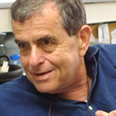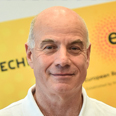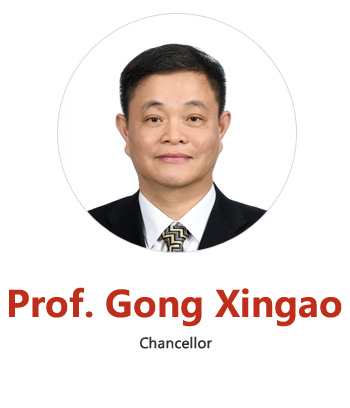


Dear students, guests, parents, and colleagues,
Today we gather here in the summer heat of Shantou, and everyone is thrilled with joy and excitement. Here, on behalf of the faculty and staff of Guangdong Technion Israel Institute of Technology (GTIIT), I would like to express my warmest congratulations to all of you and I wish you all the best in your future studies!
I feel both very excited and a bit envious every year at the opening ceremony. It was exactly 50 years ago that our generation lost the opportunity for further studies, and had to spend the youthful days to work in the countryside, mountainous and border areas of China. In those days when the future was blurred, some were confused, and depressed; some, however, fought in adversity, built up their willpower, and enriched the mind through self study. It is those who refused to give up that finally overcame the hardships and re-entered universities after many years. With the tailwind brought by forty years of reform and opening up, they made great contributions in all walks of life, some become the backbone of China’s leadership today.
Dear students, you are truly a blessed generation. You were born in the new century, the best and unprecedented period in China for thousands of years. You made a wise decision to join GTIIT, a new and wonderful life is awaiting.
You must have heard a lot about GTIIT and done some research before applying for it, but even words fail to do it justice. Now you have already visited our modern and beautiful campus, and I believe you will also be impressed by our world-class faculty starting from the pre-semester. Our exceptional faculty members come from 17 countries around the world, each one of them has obtained doctoral degrees from top universities, and has years of experience in teaching and research overseas. The advanced teaching concepts and research methods brought by them can broaden your horizons, and greatly enhance the level of our school.
GTIIT is the youngest university to be included in the provincial plan to “Achieve Excellence, Improve Weak Links and Enhance Features” in higher education. Currently four disciplines are listed as key disciplines in constructing high-level universities in Guangdong Province. GTIIT has also been designated as the supporting unit for constructing the provincial laboratory of chemistry and fine chemical engineering, which has further established the important academic position of GTIIT in Guangdong and the country.
Now GTIIT has joined the international student exchange platform of Technion-Israel Institute of Technology, so dear students, you will enjoy opportunities to study in 26 world-class science and engineering universities in the United States, Germany, Canada and other countries and regions. Of course, the exchange opportunity requires outstanding academic performance, and you need to work really hard to get it.
I would highly recommend you to visit the teaching and research laboratories that are praised by our foreign professors as “world-class”. We have the “world's most advanced and safest” teaching and research equipment, adequate resources, and strong teaching and research teams to ensures that you could enjoy first-class condition for scientific experiments.
Dear students, now you have embarked on a new journey in your life. Being away from the care and supervision of your family, you get some freedom, but please note that self-discipline becomes extremely important in university life. I hope that you will do a good job in managing your studies, your time, your emotion, your image and goal.
In his speech to the students at the Harvard Commencement, Nobel laureate Steven Chu said, “As you begin this new stage of your lives, follow your passion. If you don’t have a passion, don’t be satisfied until you find one. Life is too short to go through it without caring deeply about something. When I was your age, I was incredibly single-minded in my goal to be a physicist.” The first task for you is to adapt to the English teaching environment as soon as possible, and deeply immerse yourself in your passion.
We are in a world undergoing changes unseen in a century. Science and technology advances with each passing day. Higher education is not just about instilling textbook knowledge, but more importantly, to focus on cultivating free and innovative thinking, bold questioning, and lifelong learning abilities. Being “unconventional” and "creative" are indispensable qualities for you to keep up with the time. Four years might be a short period of time, but may reshape the taste and quality of your life.
My dear students, while devoting yourself to academic studies, I hope that you will establish social responsibilities, to participate in social practice actively, improve your comprehensive qualities, develop humanity care, and cultivate a kind and loving heart which is both a philosophy of life and a great wisdom.
I want to take this opportunity to thank the Central Government, Guangdong Province, Shantou Municipality, Technion and Shantou University for the strong support; our sincere gratitude also goes to Mr. Li Ka-shing for his generous donation and outstanding contributions; to our warmhearted parents and people from all walks of life who care about and support GTIIT; and big thanks to all the teaching, research and administrative staff of GTIIT. The achievements would not be made without the care and joint efforts of every one.
Dear students, GTIIT is at the stage for rapid and high quality development. May you seize the opportunity to stand out and fly your dream, may you prosper together with GTIIT and sail to success.
Thank you!
——Speech at the 2019 Opening Ceremony of GTIIT
August 12, 2019

Academician of the Chinese Academy of Sciences, Recipient of the National Science Fund for Distinguished Young Scholars, Leading Expert of National “Ten Thousands Talent Program”, Principal scientist of the Major Scientific Research Programs of the Ministry of Science and Technology, Fellow of the American Physical Society and Shanghai Education Hero.
In 1982, 1985, and 1993, he received his Bachelor’s, Master’s degree and Doctoral Degrees in Science respectively. Since 1993, he had been working as a researcher at the Institute of Solid State Physics of Chinese Academy of Sciences. In 2000, he was appointed as a Professor in the Department of Physics at Fudan University, where he also assumed the role of Xie Xide Distinguished Professor. In 1999, he won the National Science Fund for Distinguished Young Scholars. In 2009, he founded the Key Laboratory of Computational Physical Sciences (Fudan University), Ministry of Education and served as the Director. He was elected as an Academician of the Chinese Academy of Sciences in 2017.
His main research interests lie in computational and Artificial Intelligence (AI) physics, including the development of theoretical computational methods, calculation and simulation of low dimensional structures, computational design of new energy materials, and more. He has won the second prize of National Natural Science once and the first prize of Provincial Natural Science Award twice.
I’m very happy to join the Technion effort to build GTIIT in China’s Guangdong Province. I intend to do everything in my power to make GTIIT a state-of-the-art and world-renowned leading university, and infuse it with the highest standards of academic life, research, and teaching.
While the main thrust of the Institute at its outset will be environmental sciences, in due course I see it branching into two closely interconnected areas. I believe that in the 21st century our efforts will focus on the three following fields. The first field is the environment, and how to correct the mistakes of the 20th century, in which humanity turned a clean environment in a dirty one - spoiling our natural resources, burning up fossil fuels and creating holes in the ozone layer.
The second field is energy. We need to look for greener, cleaner sources of energy to counter the high rate of consumption of fossil fuels that were accumulated underneath the earth for millions and millions of years.
The third interconnected field is human health. As a physician, scientist, and researcher, I am occupied with human health issues, and especially the environmental effects on human health, including cancer, which is greatly affected by environmental factors like UV radiation, contamination, and air pollution.
As we embark in Shantou on a program in environmental sciences, I look forward to expanding, in the near future, to programs on energy resources and human health.
Israel and China both represent ancient civilizations, with tremendous traditions of teaching and education. We are looking forward to a joint collaboration in which we both learn from each other and together advance science for the benefit of humanity.
I invite you to join us as we embark on this wonderful journey.”
—————A letter from Professor Aaron Ciechanover

Professor Aaron Ciechanover
Aaron Ciechanover was born in Haifa, Israel in 1947. He is a Distinguished Research Professor in the Technion - Israel Institute of Technology in Haifa. He received his M.Sc. (1971) and M.D. (1973) from the Hebrew University in Jerusalem. He then completed his national service (1973-1976) as military physician, and continued his studies to obtain a doctorate in biological sciences in the Faculty of Medicine in the Technion (D.Sc.; 1982). There, as a graduate student with Dr. Avram Hershko and in collaboration with Dr. Irwin A. Rose from the Fox Chase Cancer Center in Philadelphia, USA, they discovered that covalent attachment of ubiquitin to a target protein signals it for degradation. They deciphered the mechanism of conjugation, described the general proteolytic functions of the system, and proposed a model according to which this modification serves as a recognition signal for a specific downstream protease. As a post- doctoral fellow with Dr. Harvey Lodish at the M.I.T., he continued his studies on the ubiquitin system and made additional important discoveries. Along the years it has become clear that ubiquitin-mediated proteolysis plays major roles in numerous cellular processes, and aberrations in the system underlie the pathogenetic mechanisms of many diseases, among them certain malignancies and neurodegenerative disorders. Consequently, the system has become an important platform for drug development.
Among the numerous prizes Ciechanover received are the 2000 Albert Lasker Award, the 2003 Israel Prize, and the 2004 Nobel Prize (Chemistry; shared with Drs. Hershko and Rose). Among many academies, Ciechanover is member of the Israeli National Academy of Sciences and Humanities, the American Academy of Arts and Sciences (Foreign Fellow), the American Philosophical Society, the National Academy of Sciences of the USA and the Institute of Medicine of the National Academies of the USA (Foreign Associate), the Pontifical Academy of Sciences at the Vatican, the Chinese Academy of Sciences (CAS; Foreign Member), and the Russian Academy of Sciences (Foreign Member).

Professor David Gershoni received his B.Sc. in Physics 'summa cum laude' from the Technion - Israel Institute of Technology in 1980. He then pursued his graduate studies in the same institute, during which he was awarded the Wolf Prize for Excellence. In 1986, he completed his academic education, receiving both his M.Sc. and D.Sc. in Physics from the Technion. Following his graduation, Prof. Gershoni declined a Fulbright Postdoctoral Fellowship to join AT&T Bell Laboratories in Murray Hill, New Jersey – first as a postdoctoral scholar and later, in 1988, as a member of the technical staff. In 1991, he returned to the Department of Physics at the Technion as a faculty member, while remaining a consultant for AT&T Bell Laboratories until 1996. Since 1998 he is a Full Professor of Physics and the incumbent of the Feinberg Academic Chair. In 2004 he was made a Fellow of the American Physical Society "for pioneering experimental and theoretical studies of the optical properties of nanostructured semiconductors, including nanowires and single self-assembled quantum dots".
Prof. Gershoni's expertise is in experimental studies of optical and electronic properties of semiconductor systems of lower dimensionality and their applications in quantum optics and in quantum information processing.
Over the course of his career, Prof. Gershoni has published over 200 articles in international peer-reviewed journals and has organized and been invited to lecture at many major international conferences and workshops. In 2004 and in 2010 he received the Technion’s Henry Taub Prize for Excellence in Research, and in 2012 he received the International Symposium on Compound Semiconductors Quantum Devices Award for "pioneering research in quantum optics of semiconductor nanostructures, including the first demonstrations of single and entangled photon emissions and the coherent access of the dark exciton." In 2014 Prof. Gershoni received the Israeli National Lottery-Landau Prize for Arts and Sciences in the Physics Category "for developing a method for emitting pairs of entangled photons from semiconductor quantum structures, leading to possible generation of entangled photons on demand". In 2016 Prof. Gershoni was awarded a European Research Council - Advanced Grant "for deterministic generation of polarization entangled single photon cluster-states" .
© GUANGDONG TECHNION-ISRAEL INSTITUTE OF TECHNOLOGY | 粤ICP备17036470号
